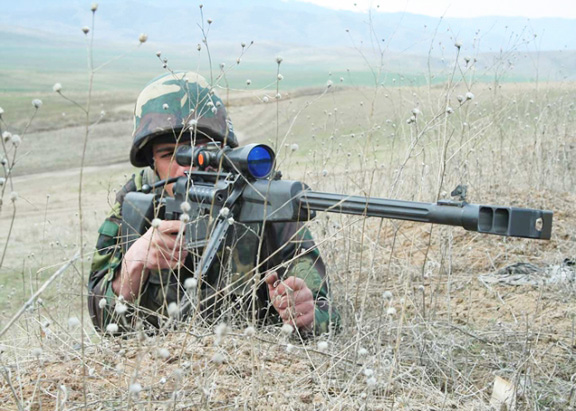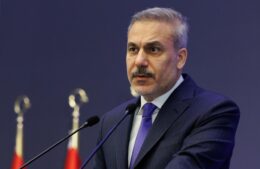3 Killed in Azerbaijani Attack on Armenia’s Tavush Region
- (0)

An Armenian soldier on the front lines
ANCA Calls on State Department, OSCE Minsk Group to Condemn Azerbaijani Attack
YEREVAN—Azerbaijani forces attacked the Chinari village in the northeastern Armenian province of Tavush on Thursday, killing three soldiers of the Armenian Armed Forces and raising concerns with the Collective Security Treaty Organization, whose leader cited the April attacks against the “Nagorno-Karabakh Republic,” in his statement calling the incident “a provocation” against a “member state.”
Armenia’s Defense Ministry reported Thursday that the attack against Armenia was thwarted. Nevertheless, three soldiers, Senior Lieutenant Shavarsh Melikyan, privates Edgar Narayan and Erik Abovyan were killed during the operation.
The CSTO Secretary General Nikolay Bordyuzha’s statement, in which he expressed concern, was rare in its timing and tone, especially the CSTO’s reference to Artsakh as the “Nagorno-Karabakh Republic.”
“The CSTO Secretariat was worried to learn about the armed incident near the village of Chinari in the Republic of Armenia,” said Bordyuzha in his statement.
“We consider these actions on the territory of a CSTO member state as a provocation, especially against the background of a rather serious incident in the Nagorno Karabakh Republic with application of heavy weapons and armored vehicles in April this year,” added Bordyuzha.
“It seemed that considering the efforts taken by both parties, as well as the leaders of a number of countries, the process of the resolution of the Nagorno Karabakh could finally proceed more actively,” said Bordyuzha.
He added, however, that “the recent reports from the region on the ceasefire violations, especially the recurrent incident on December 29 that resulted in the death of servicemen, cause serious concerns.”
In a statement immediately following the Chinari attacks, Armenia’s Foreign Ministry strongly condemned Azerbaijan and accused Baku of damaging the negotiation process.
“Under the conditions, when the serious damage caused to the negotiation process as a result of the Azeri aggression unleashed against Artsakh in April, Baku resorted to new adventurism, harshly violating the agreements reached in Vienna and St. Petersburg and ignoring the commitment to solve the issue in a peaceful way. This is the way Baku responds to the requirement of the Foreign Ministers of the OSCE Minsk Group co-chairing countries to unconditionally respect the ceasefire agreements of 1994 and 1995,” said the foreign ministry statement.
“The international community, through the Minsk Group Co-Chairs, has on many occasions urged [Baku] to respect the ceasefire, especially on holidays. By resorting to an act of sabotage at the eve of the New Year and Christmas, Baku goes against universal human values,” the Ministry said.
“The international community, the OSCE Minsk Group co-chairing countries should restrain the Azerbaijani leadership, which stubbornly ignores their calls and requirements and which has lost the sense of reality,” the statement added.
Armenia’s Defense Ministry described Thursday’s attack as an infiltration attempt by Baku, during which the Azerbaijani s used weapons of various caliber, including sniper rifles and grenade launchers.
Defense Ministry spokesperson Artsrun Hovannisyan claimed that Azerbaijani forces suffered up to seven losses as the Armenian troops “neutralized” the Azerbaijani attacks.
Thursday’s attack on the Armenian border region comes eight months after Azerbaijani unleashed massive attack on several positions of the Artsakh border, killing more than 100 Armenian soldiers and civilians.
During the April attack, Azerbaijani used tanks, military helicopters, drones and other heavy artillery, some purchased from Israel in a deal that Baku recently estimated as being worth upward of $5 billion.
The Armenian National Committee of America condemned Azerbaijan’s use of force against Armenia.
“Ilham’s Aliyev’s fatal cross-border attack today into Armenia follows a deeply troubling, yet clearly predictable multi-year pattern of Azerbaijani aggression around the Christmas and New Year holidays,” said Aram Hamparian, Executive Director of the ANCA. “We have called upon our State Department and OSCE Minks Group partners to immediately, forcefully and explicitly condemn Baku’s reckless belligerence.”
It is painfully clear, as we close out the most deadly year since the 1994 Artsakh ceasefire, that weak and ineffective OSCE leadership – characterized by a stubbornly artificial evenhandedness and an equally dogged determination to never call out Azerbaijan for aggression that it has long since stopped trying to conceal – has only emboldened Aliyev. With the advent of 2017, we look to our government and the international community to break with this record of failure and forcefully check Baku’s aggression.”


















